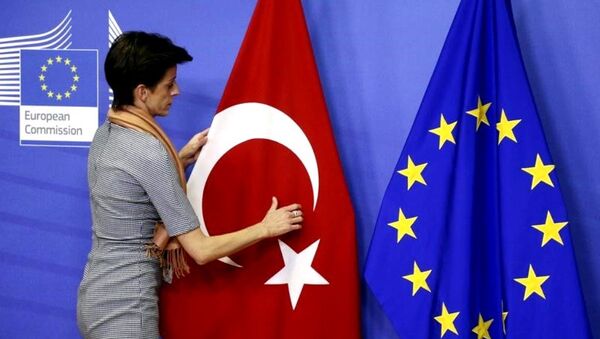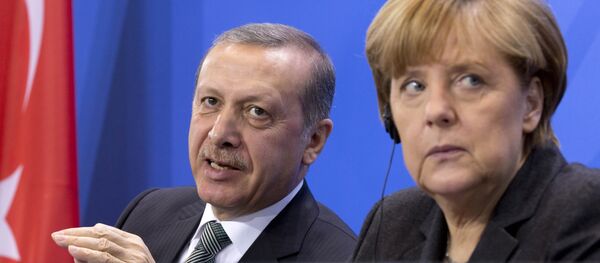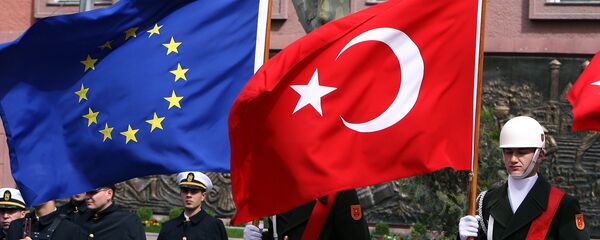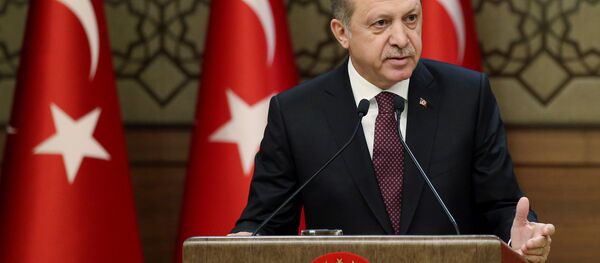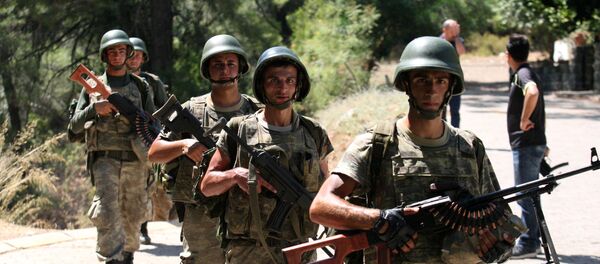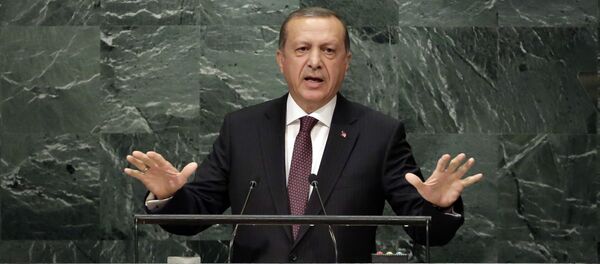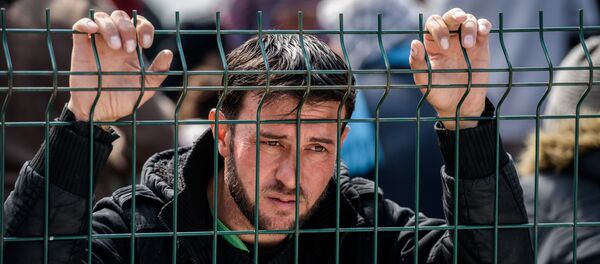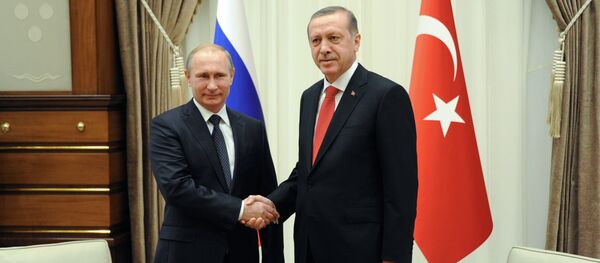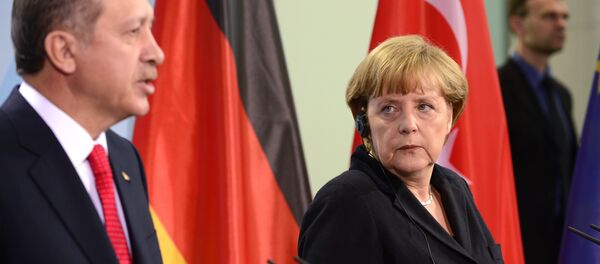MOSCOW (Sputnik) — After a decade of on-and-off talks, Turkey looked well on its way to full EU membership and visa-free travel this spring when it struck a pivotal migrant deal with Brussels, before veering off the track and parting ways with the European Union after a wave of criticism in the wake of the failed coup attempt.
Turkey has been chasing EU membership since before its conception almost six decades ago when Ankara first applied to EU’s precursor, the European Economic Community, in 1959. It became a candidate for EU accession in 2005 but the talks were slowed down by stiff opposition from Germany and Austria.
The resulting migrant wave swept the continent reaching up to Scandinavia. The rising flow of arrivals and mass deaths at sea shocked EU leaders and sent them looking for help in Turkey, which suddenly found itself in a rare position of power in membership talks with Brussels.
TIES OFF TO PROMISING START
A self-defining moment for Ankara came in March 2016 when an EU-Turkey summit ended with a deal, which would see Turkey take back migrants coming ashore illegally in Greece in exchange for roughly $6.4 billion in financial aid and major concessions on membership and visas.
Turkey was promised an "accelerated pace" of accession process, including the opening of another chapter in EU’s 35-point checklist for membership hopefuls by the end of June. The same deadline was set for it to meet 72 conditions that would earn Turks visa-free access to the borderless Schengen zone.
German Chancellor Angela Merkel praised the arrangement on May 25, saying tight border controls had cut the number of migrants crossing the Aegean Sea from Turkey by as much as 90 percent, but suggested visa liberalization process could take more time than expected, prompting threats from Ankara to rip up the pact.
FORK IN THE ROAD
The EU-Turkey dialogue on a closer relationship hit a bump in the road when Ankara balked at EU’s demands to change its anti-terrorism laws, citing national security concerns. Turkey has a history of fighting Kurdish separatists and has recently been targeted by Islamists from neighboring states.
"I'm sorry, we will go our way, you go yours. Go make agreements with whoever you can," the president said in a thinly-veiled threat to pull Turkey out of the migrant deal if visas were not scrapped.
Two weeks before the July deadline for loosening visa rules, the European Commission announced Turkey failed to meet the outstanding conditions. The June 28 bombing of Istanbul Ataturk Airport only strengthened Erdogan’s resolve to curb extremism, and progress in EU-Turkey talks stalled.
COUP PURGE ‘RED LIGHT’
The July 15 attempt by the military to overthrow President Erdogan led to a state of emergency that gave him powers to go after dissident officials and media. Thousands were accused of having ties to US-based cleric Fetullah Gulen, who was blamed for masterminding the failed power grab.
EU foreign ministers and senior officials in Brussels made it clear to Ankara its open-ended accession process to the bloc would get a red light if it returned the capital punishment. Turkey scrapped the death penalty in 2004 as it prepared to file a bid for EU membership.
European Commission President Jean-Claude Juncker said during a televised interview on July 25 the EU’s executive body was still ready to continue with entry talks, "but if Turkey reintroduces the death penalty tomorrow morning we will immediately stop the negotiations," he warned.
Turkey’s arrest in late October of journalists from the Cumhuriyet, a major local daily, prompted a warning from European Parliament President Martin Schulz that it had crossed "yet another red line" against the freedom of expression. Turkish Prime Minister Binali Yildirim hit back with a casual "Brother, we don't care about your red line … We draw another red line on top of yours."
In another sign of a meltdown in the EU-Turkish relationship, President Erdogan declared in November he could put the issue of continuing EU accession talks to a referendum early in 2017 and threatened to let refugees into Europe. Turkey is hosting some 3 million of Syrian refugees.
STANDSTILL BUT NOT QUITE
The European Parliament accused Turkey in November of diverting from its EU path and voted 479 to 37 to halt accession talks until it lifted "repressive measures." If endorsed, this non-binding resolution would have prevented Brussels from opening any new negotiating chapters.
Turkey’s Prime Minister Yildirim was quick to demand that EU leaders denounce the vote, while its diplomat in charge of EU affairs, Omer Celik, called the resolution short-sighted and vowed Turkey would push ahead with its efforts to defeat terrorism.
At the December 13 meeting of EU foreign ministers, Austrian Foreign Minister Sebastian Kurz urged for talks with Ankara to be put on ice after the number of those arrested in the Turkish post-coup purge reached 100,000 people.
Despite agreeing that accession talks with Turkey had come to a standstill, the rest of EU foreign ministers refused to heed calls for a freeze, indicating that Europe was still reluctant to alienate a country whose help it needs to keep thousands of refugees at bay.
U-TURN TO RUSSIA
Just when the EU-Turkish ties hit a decade low in summer, Ankara made a surprise U-turn and got back in touch with Moscow, with whom it had not been on speaking terms ever since a Turkish jet shot down a Russian frontline bomber in Syria in November 2015.
The thaw came in July when President Erdogan wrote a letter of apology to Vladimir Putin of Russia and visited an economic summit in St. Petersburg in the following month. The presidents met for a second time in Istanbul in October to revive a stalled gas pipeline project called the Turkish Stream.
Andrei Karlov, the Russian ambassador to Turkey, said in mid-December Putin had been speaking with his Turkish counterpart more often than with any other leader. He estimated the two had met thrice and talked 11 times on the phone in the past three months.
ALTERNATIVE TO EU?
Against a backdrop of tighter energy and trade ties, President Erdogan said in November Turkey was no longer fixated on entering the European Union, which, he indicated, looked set to unravel after UK’s vote to quit last June.
"Brexit can spread, such voices are heard from France, Italy. Under these circumstances, Turkey should feel calm," Erdogan told reporters, adding he was mulling the membership of the Shanghai Cooperation Organization (SCO), a regional economic and political bloc led by Russia and China.
"One should not say that the European Union is the only option. Why cannot Turkey become a member of the SCO?" he said after a visit to Uzbekistan, a SCO member. "Turkey's participation in the SCO will give us more freedom of action in this regard."
In a separate statement in early December, the Turkish president described his country’s relationship with Russia, China and Iran as being at its peak – in contrast to the rising tensions in ties with European allies. He stressed this rapprochement did not make Ankara’s EU ties impossible.
"Are Turkey’s ties with the West strong and are they weak with the East? Quite the opposite," Erdogan said. "These relations are not an alternative to each other. On the contrary, we perceive these ties as complementary."
